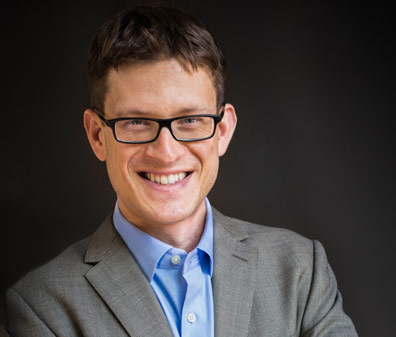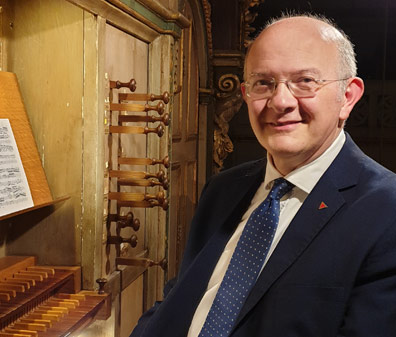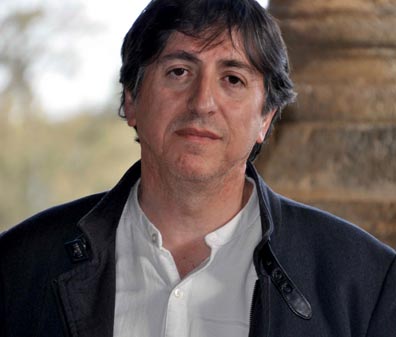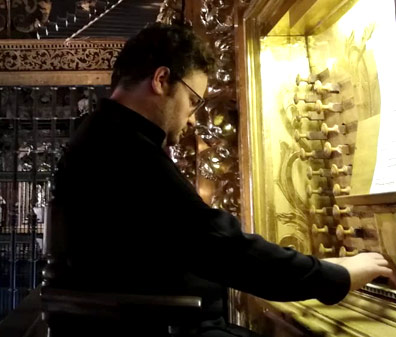XXVI ACADEMY
XXVI Academia de Órgano
Fray Joseph de Echevarría

Balint KAROSI
Director of Music at Saint Peter’s Church in New York City.
+ INFO
The middle-German Tradition
In this class, Prof. Karosi will coach individual students, approaching Thuringian organ works from a composer’s perspective. The goal is to differentiate between essential, and non-essential components of a musical composition in order to establish a stylistic framework, in which there is room for individual interpretation, ornamentation and improvisation. The class will also focus on basic organ technique; touch, articulation, posture, pedal technique, and registration. Each participant should choose a – preferably – chorale-based work by one of the composers of the Thuringian, middle-German school, including, but not limited to the following composers:
Johann Pachelbel (1653-1706)
Georg Böhm (1661-1733)
Johann Gottfried Walther (1684-1748)
Johann Sebastian Bach (1685-1750)
Wilhelm Friedemann Bach (1710-1784)
Johann Ludwig Krebs (1713-1780)
Gottfried August Homilius (1714-1785)

Enrico VICCARDI
Enrico Viccardi, born in 1961, received his diploma in Organ and organ Composition with first-class standing from the Conservatory of Piacenza, studying under Giuseppina Perotti. He then perfected his skills with Michael Radulescu at the Hochschule für Musik in Vienna.
+ INFO
Journey through Italy
The course program aims to present a sort of journey through Baroque Italy by analyzing the musical treasures that some of the most important authors of keyboard compositions have left us, from the elegant virtuosity of Claudio Merulo to the novelties of Frescobaldi’s writing, with the passage from the “effects” to the “affects” of his seconda prattica (paraphrasing Monteverdi). Original figures are then those of Tarquinio Merula and Bernardo Storace who head towards the new frontiers of tonal language. Bernardo Pasquini and Alessandro Scarlatti finally open the doors to the eighteenth century, in which the Concert genre will reign.
Claudio Merulo (1533-1604)
Girolamo Frescobaldi (1583-1643)
Tarquinio Merula (1595-1665)
Bernardo Storace (sXVII)
Giovanni Salvatore (1620-1688)
Bernardo Pasquini (1637-1710)
Alessandro Scarlatti (1660-1725)
Conciertos de compositores italianos transcritos para teclado por:
Johann Gottfried Walther (1684-1748)
Johann Sebastian Bach (1685-1750)
Thomas Billington (ca. 1754-1832)
Anne Dawson (sXVIII)

Roberto FRESCO
Professor of organ at the Centro Superior de Enseñanza Musical Katarina Gurska, also in Madrid.
+ INFO
The divided keyboard: “famous invention and well known in the kingdoms of Castile, although not known in others”
Sebastián Aguilera de Heredia (1561-1627)
Francisco Peraza (1564-1598)
Francisco Correa de Arauxo (1584-1654)
Jusepe Ximenez (1600-1672)
Pablo Bruna (1611-1679)
Juan del Vado (1625-1691)
José Torrellas (s. XVII)
Joan Cabanilles (1644-1712)
Gabriel Menalt (1657-1687)
Antonio Soler (1729-1783)
Joaquín Sánchez (+1800)
José Lidón (1748-1827)
SEMINARS AND LECTURES

Jorge GARCÍA
+ INFO
Is there a place in the teaching of the future for a pedagogy of the past?
Despite having been one of the key aspects in the training of a musician and a common requirement in his professional development, the reality is that for many decades its importance and weight within musical education has been relegated. Until now.
This conference aims to offer a vision of the importance that the art of improvisation had in past centuries through the different preserved sources and how, at present, these sources can be interpreted to apply them in the musician’s training.

Balint KAROSI
Director of Music at Saint Peter’s Church in New York City.
+ INFO
“Deconstructing history” contemporary organ repertoire for historic organs
CLASSES
- The course will have a duration of 50 hours approximately.
- There will be a maximum of 12 active students.
- Academy proffesors will offer 45 minutes individual lessons to those students who request them. Enrollment for these classes will be held in strict order of registration.
- Some of the scores for the course can be provided on request.
ACCOMODATION
APPLICATION
ACTIVE PARTICIPANT: Registration 150€
- Individual lesson: 25€.
PASSIVE PARTICIPANT: 80€
Fee to be paid into the following bank account: IBAN ES90 2108 2401 6500 3309 8696
Bank: UNICAJA BANCO
Registration deadline: until 10th June, 2023.
INFORMATION AND REGISTRATIONS
Plaza de San Pablo, 8 E-34005 – Palencia
Teléfono: (+34) 629 878 681
Correo electrónico: echevarría.org@telefonica.net
www.aaopalencia.org
ORGANIZA

PATROCINA

Política de Privacidad
Aviso Legal
Política de Cookies
